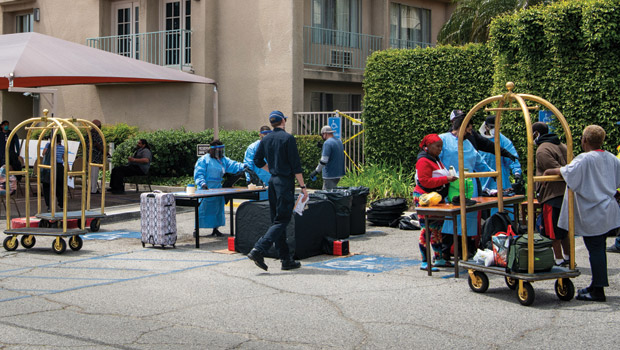Medical homes for homeless patients during COVID-19
This issue also covers racial disparities and COVID-19, conference coverage on diabetes and LGBTQ care, and myocardial infarction in the elderly.
COVID-19 has changed medical care for everyone, but one group uniquely affected is patients experiencing homelessness. While those who live on the street are usually at higher risk for poor health outcomes than those in shelters, COVID-19 thrives in close quarters, so physicians caring for homeless patients have needed to seek out innovative solutions. Senior Writer Mollie Frost talks to physicians in California, Boston, Baltimore, New York City, and Atlanta to find out how they are managing this unprecedented situation. Examples include hotel housing, universal testing, and scaled-back versions of telemedicine.
COVID-19 has also thrown racial and ethnic disparities in health care into stark relief. The virus has had a disproportionate effect on people of color throughout the U.S., due to such risk factors as underlying health conditions exacerbated by social determinants of health and decreased access to physicians. People of color are also less likely to have jobs that allow them to social distance, increasing their risk for COVID-19 on an everyday basis. Our story looks at how the pandemic has spotlighted the unconscionable divides in our health care system and how they can be addressed now and going forward.
Two conference coverage stories in this issue are from the American Diabetes Association's 2020 Scientific Sessions, held virtually in June. Screening for and, consequently, treatment of kidney disease in patients with diabetes are often suboptimal, increasing the risk for poor outcomes. Experts discuss screening guidelines and drug choices, including old standbys and newer agents. Another story from the meeting explores why physicians may want to move away from a primary focus on weight when caring for patients with diabetes. And for more conference coverage, read a story from the American Society of Clinical Oncology's virtual conference in May, which looks at ways to improve care for LGBTQ patients, in part through better physician education.
Also in this issue, a feature story looks at best practices for management of medications after myocardial infarction in the elderly, examining the evidence for de-escalation as well as the importance of considering patients' wishes when deciding on a course of care. And, get a glimpse of the future in a Q&A with a fourth-year medical student describing an exciting, ambitious project to help decrease fatal opioid overdoses in the community: naloxone delivery via drone.
Finally, if you're in need of some words of grace and encouragement as we head into the fall of 2020, I can highly recommend the excellent President's Message by ACP President Jacqueline W. Fincher, MD, MACP. We at ACP Internist are thinking of you all and would love to hear from you any time at immatters@acponline.org.
Sincerely,
Jennifer Kearney-Strouse
Executive Editor




